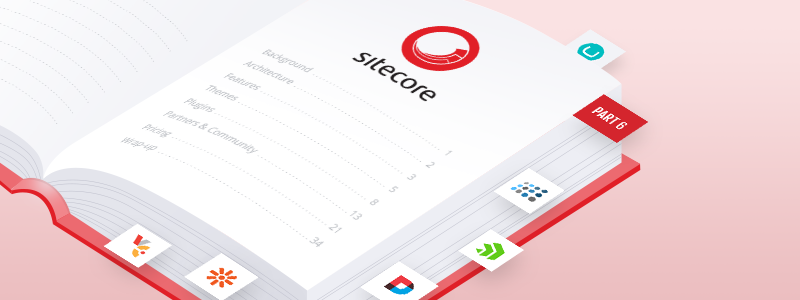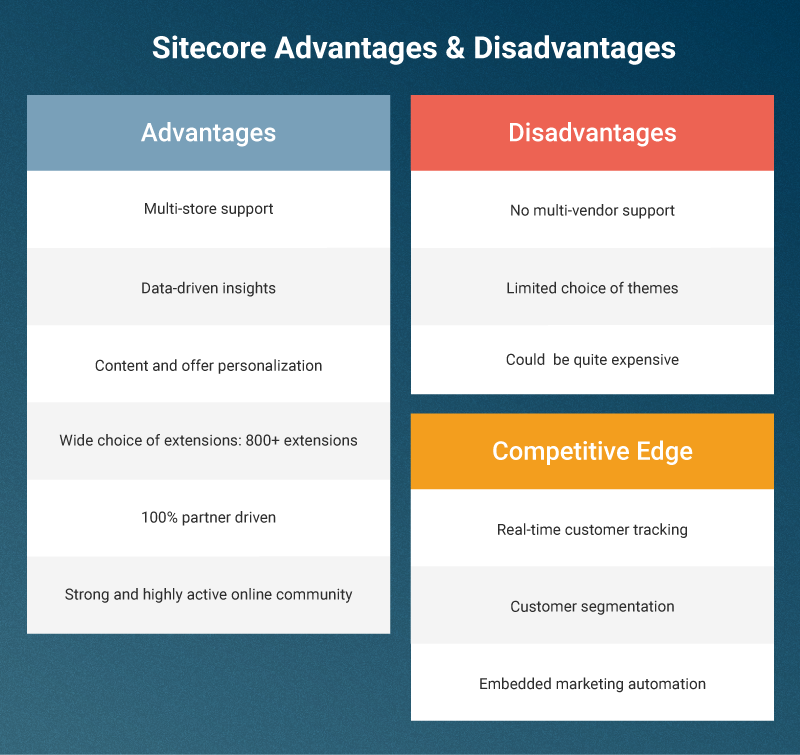Sitecore Review: Features, Marketplace, and Pricing

This article is part of a series of blog posts dedicated to the best .NET e-commerce platforms out there - nopCommerce, Virto Commerce, DNN, Umbraco, Kentico, Sitecore, and Sitefinity.
So far, we have discussed nopCommerce, Virto Commerce, DNN, Umbraco, and Kentico.
Today, we will talk about Sitecore - an integrated e-commerce solution and a CMS (Content Management System) platform based on ASP.NET Core.
Sitecore’s e-commerce product is called Sitecore Experience Commerce - a cloud-enabled platform that leverages the power of content, commerce, and customer data. As a result, it enables you to deliver more personalized and value-driven customer experiences across multiple channels.
Sitecore History
Sitecore was founded in 2001 in Copenhagen, Denmark but its story began in 1998 when 5 friends (University of Copenhagen alumni) founded Pentia A/S.
Pentia A/S was a systems integration company that patented a set of tools for website development and content management. The most popular product the company developed was a CMS called Sitecore. In 2001 Sitecore became a separate entity.
Over the years, Sitecore acquired Pectora’s development team and intellectual property (2011), took ownership of Commerce Server’s development and marketing (2013), introduced its social media marketing suite Sitecore Social (2014), and more.
In 2016 Sitecore was recognized as one of the companies that matter most in the digital content industry (by EContent Magazine).
Its last stable version, Sitecore 9.0, was released in October 2017. The same year Sitecore was named a Leading Commerce Platform (by DealCrunch).
In 2018 Sitecore was awarded the Top Rated award (by TrustRadius). In addition, it continued its “9-year run as a Leader in Gartner’s Magic Quadrant for Web Content Management” (source: Sitecore website).
Sitecore Architecture
All Sitecore products (i.e. Sitecore Experience Manager, Sitecore Experience Platform, and Sitecore Experience Commerce) are based on a microservice architecture. This enables you to easily scale your Sitecore solution.
Each Sitecore service implements a number of roles and entities that form the functionalities of the Sitecore platform.
The roles and entities can be classified as:
- Storage roles - the storage roles store data such as content, customer information, etc.
- Application roles - there are two types of application roles: web roles and worker roles
- Indexes - their purpose is to help you find data more easily
- Cloud services - services that are hosted by Sitecore in the cloud
Watch this video to learn more about the architecture of Sitecore
Sitecore Features
Some of the more significant features Sitecore Experience Commerce offers include:
- A drag-and-drop interface with 40+ e-commerce controls. You can create beautiful product pages, promotional campaigns, etc.
- Multi-store support
- Multi-warehouse support
- CMS features
- Real-time customer tracking. Sitecore tracks and learns from every single customer interaction. Then, it gives you valuable data-driven insights. As a result, it enables you to deliver personalized and contextual customer experiences.
- Embedded marketing automation
- Customer management. You can segment your customers, manage customer information, and more.
- Catalog management. You can create and manage product catalogs and category hierarchies. You can display them in different languages, currencies, etc.
- Inventory management. You can manage multiple inventory sets, online-to-offline inventory, as well as inventory for multiple stores, multiple warehouses, etc.
- Order management. You can manage order details, returns, refunds, fulfillment options, payment options, etc. You can also hold, cancel and delete orders, as well as add, edit, or delete items from pending orders, and more.
- Promotions management. You can create rule-based discounts, apply multiple qualifications to a promotion, calculate bulk promotions, offer coupons, etc.
- Pricing management. You can allow multiple purchase options, support multiple currencies, etc.
- Braintree integration
- Seamless integration with back-office systems such as CRMs, ERPs, etc.
Similar to Umbraco and Kentico, Sitecore integrates with Ucommerce. The price is €6.999 per year per production server. Read more here
Sitecore Themes
Sitecore Experience Commerce offers two types of themes:
- Site Themes - basic themes with limited functionalities
- Base Themes - foundation themes with more advanced functionalities
Ultimately, if you choose Sitecore, your choice of themes will be very limited. However, you can build a custom theme for your website from scratch and customize it in a way that perfectly meets your business needs. If you cannot do this in-house, you will have to outsource it to a third-party .NET developer, or a certified Sitecore partner. In any case, there will be additional costs.
See how to add an existing theme to your Sitecore e-commerce website or create one from scratch
Sitecore Plugins
There are more than 800 plugins on the Sitecore Marketplace that are divided into 14 categories: administration, commerce, translation and localization, website optimization, setup and deployment, and more.
Sitecore offers a variety of plugins: automated publisher, licence expiration notifier, code editor, tax solutions, custom checklist fields, advanced image module, authenticated preview, media template changer, language fallback module, analytics database manager, and much more.
Sitecore Partners & Community
Sitecore’s partner companies are classified as:
- Solution partners - companies that provide implementation services, support, digital marketing solutions, and more. There are 3 levels of solution partners -silver, gold, and platinum. Find a Sitecore solution partner to work with.
- Technology partners - companies that extend the capabilities of Sitecore. Sitecore has 22 technology partners among which Microsoft, Coveo, and more.
Note that Sitecore is strongly supported by its partners.
In fact, Sitecore is “100 percent partner driven”, meaning that they have never built a single solution for a customer. Such solutions come solely from their partners.
Sitecore is strongly supported by its online community as well. Sitecore’s community consists of developers, designers, marketers, store owners, .NET enthusiasts, etc.
The community is highly active on the Sitecore forum - there are thousands of posts, new posts appear every day, and, at the time of this writing, the last activity on the forum was 5 hours ago.
Sitecore Pricing
You can purchase a licence for 4 Sitecore products:
- Sitecore Experience Platform
- Sitecore Experience Commerce
- Sitecore Experience Manager
- Omnichannel marketing add-ons
The product licensing is subscription-based. It takes into account the number of monthly visits, the number of installations, the number of users, and the add-ons.
If you need premium 24/7 support for any of the products, you can purchase a premium support package.
Read more about license models, or get a quote
Wrap-up

We hope this article gave you a better idea of what Sitecore offers! Stay tuned for our article on Sitefinity - the next blog post from the series dedicated to the best .NET e-commerce platforms!




